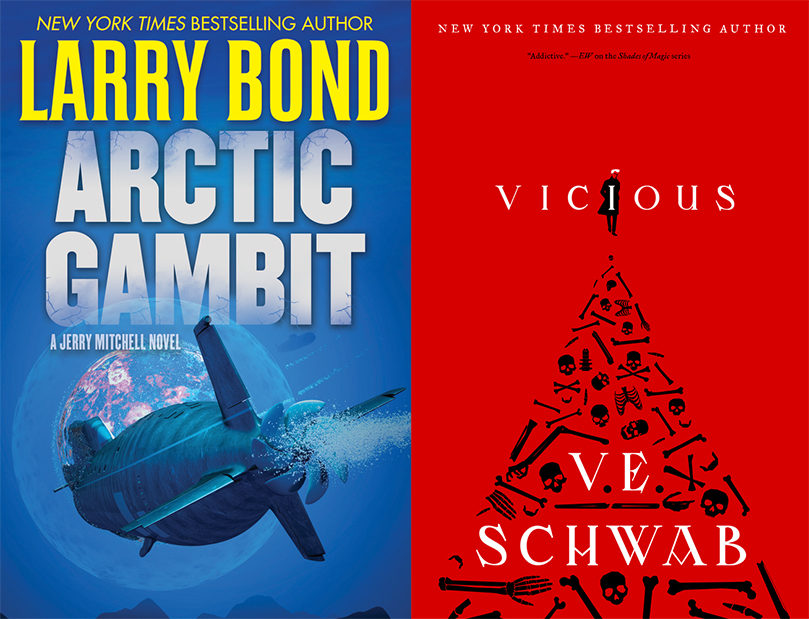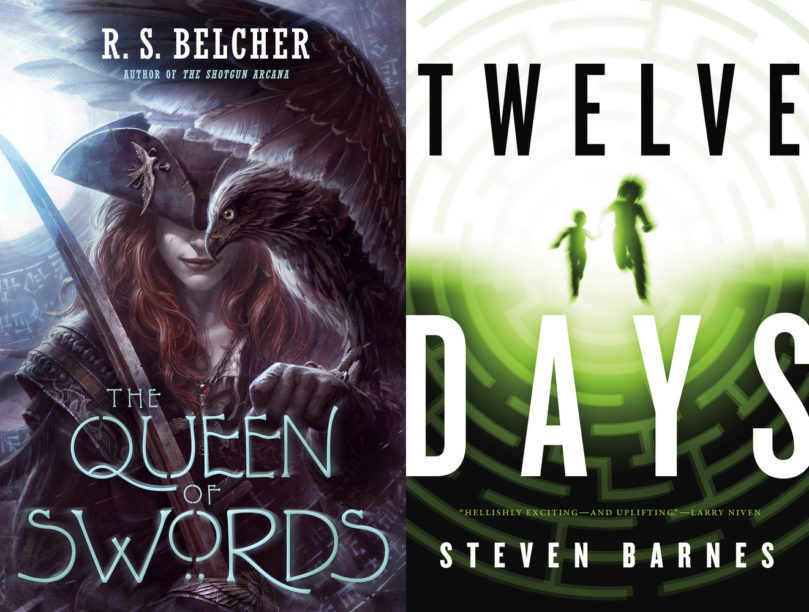opens in a new window opens in a new window
opens in a new window opens in a new window
opens in a new window opens in a new window
opens in a new window opens in a new window
opens in a new window opens in a new window
opens in a new window
opens in a new window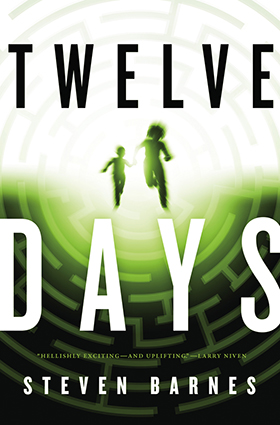
Around the world, leaders and notorious criminals alike are mysteriously dying. A terrorist group promises a series of deaths within two months. And against the backdrop of the apocalypse, the lives of a small shattered family and a broken soldier are transformed in the bustling city of Atlanta.
Olympia Dorsey is a journalist and mother, with a cynical teenage daughter and an autistic son named Hannibal, all trying to heal from a personal tragedy. Across the street, Ex–Special Forces soldier Terry Nicolas and his wartime unit have reunited Stateside to carry out a risky heist that will not only right a terrible injustice, but also set them up for life—at the cost of their honor. Terry and the family’s visit to an unusual martial arts exhibition brings them into contact with Madame Gupta, a teacher of singular skill who offers not just a way for Terry to tap into mastery beyond his dreams, but also for Hannibal to transcend the limits of his condition. But to see these promises realized, Terry will need to betray those with whom he fought and bled.
Meanwhile, as the death toll gains momentum and society itself teeters on the edge of collapse, Olympia’s fragile clan is placed in jeopardy, and Terry comes to understand the terrible price he must pay to prevent catastrophe.
opens in a new windowTwelve Days will become available June 27th. Please enjoy this excerpt.
CHAPTER ONE
December 14
5:37 a.m. PST
Mexico City
The offices of television station XTRB were located in a two-story brick building nestled between a sleepy residential district and a commercial section of Mexico City known as El Corredor. The building had once been a carniceria, rebuilt in the 1990s during an uptick in the Mexican economy, responding to the needs of a society driven more by communication than consumption of fajitas.
The tide of XTRB technicians, artists, and office folk ebbed and flowed at all hours. At first this had seemed a remarkable thing, but in time the formerly sleepy neighborhood had grown to take its renaissance in stride.
Not today. Today the neighborhood was already abuzz, aware that something very special was about to occur.
Former governor of Chihuahua Ramone Quinones, a man not seen in public since his indictment for drug trafficking and murder, was on his way.
Death followed closely behind him.
Carlos Garcia had been a producer since the day he had learned it paid more than managing a publisher’s warehouse, or more specifically since his sister had married the owner of XTRB. As his mother had often told him, “Fortuna favorece a los que se casan de riqueza”: Fortune favors those who marry well.
And of course, their brothers.
Generally, Garcia considered his new position a decided improvement over the old, but today he realized that his ordinarily focused but intense mood could best be described as “flustered,” and that some other emotion lurked just beneath the surface. To his surprise, that emotion seemed to be fear.
As had become his habit in recent months, he vented his anxiety upon Sonia Torres, the tall, slender lovely who anchored the morning talk show. During seven months of their volcanic affair, it had often seemed to Garcia that her body was a husk filled with live coals. In many ways they were two of a kind. Sonia shared his own fierce ambition, as well as his amorality and political agnosticism, a general disinterest about anything except rungs on the ladder of success. There were times when there seemed nothing of softness or femininity about her at all. In comparison with Teresa, the slack, unresponsive wife who awaited him at home, Sonia was indeed firm. Sinewy. Possessed of that sort of feral strength a man needed to feel, a web of passion drawing him into her fire. At times, the memory was almost more visceral and immediate than he could bear.
But while at work, they could never acknowledge or suggest anything of the passion they had shared. That had been the arrangement when their affair began, and neither of them had ever violated it, regardless of how much he might have yearned to.
So instead of confessing that he wished he had been able to awaken next to her, even once, he barked complaint. “Get that damned shine off your cheeks, Sonia! Damn it! Makeup!” She arched one sculpted eyebrow at him, perhaps believing imperfection impossible for such a golden creature as she. Sonia nodded at the makeup girl who hovered at the side of her chair as she tested her mic, and read over her prepared statements.
Their director, Manny Vasquez, was a short, skinny guy whose major claim to fame was that, as a boy, he had brought coffee to the great Cantinflas on the set of his last movie, El Barrendero. How many times had they had to listen to that mess! Cabron!
Now, the little man was all nerves. “Have you heard from Quinones?” he asked. “Is this still happening?”
Garcia nodded. “They called me fifteen minutes ago. He’s on the way from Juárez International.”
Vasquez sighed hugely. “I don’t see how we’re going live if—”
Before he could finish, the studio’s double doors opened, and an intern whose name Garcia could never remember popped her head in. “Thirty seconds to convoy!” she said.
Despite his staff’s veneer of professionalism, the excitement was infectious. He sighed. Even the glacial Sonia seemed to ovulate at the very thought of meeting the drug lord. It was true: “El que no transa, no avanza”—loosely: You’re not going anywhere if you don’t cheat. His mother had said that as well, bless her mercenary heart.
Reluctantly, he sidled over to the street-side windows in time to see the black motorcycle procession pulling into the spaces marked off with red cones. A black limousine half the length of the block itself miraculously navigated the turn and slid into the underground garage.
He huffed and ran his fingers through his hair. With one last angry glance at Sonia, Carlos Garcia sprinted for the elevator.
Twenty-five seconds later the elevator opened on the underground level. Even before the steel slabs parted, Garcia felt the energy wash through the door. Despite his anxiety and thwarted lust for Sonia, he had to admit that XTRB had scored a tremendous coup. Quinones was scheduled to appear in court in just four hours, at ten o’clock. The morning news show created buzz, and Garcia reckoned that Quinones was doing everything in his power to poison the jury pool, tainting and confusing the narrative that he had abused the privileges of office to enrich himself in the business of narcotraficante. In a moment, the parking garage boiled with bodyguards and assistants. Steel and Kevlar-reinforced Mercedes-Benz SUVs with deeply tinted windows and police cars driven by off-duty officers crammed the garage. Bulky men with eyes like chips of black ice were positioned like a line of concrete slabs as the limo pulled along the wall, blocking ten parking spaces that had been set aside with red traffic cones.
The engine died. The door of the limo opened and a tall, elegantly handsome man exited.
With all his heart, Garcia yearned to despise Quinones. There were so many reasons to do so. From the crimes he had been accused of, to his hand-tailored Bijan Pakzad suits (identical to one worn by American actor Tom Cruise and Mexican president Enrique Peña Nieto), to his perfect physical condition (said to be the result of three miles of daily ocean swimming under the view of snipers recruited from the Grupo Aeromóvil de Fuerzas Especiales, Mexican Special Forces soldiers. Perfectly competent to deal with rival narco traffickers but Garcia wondered how they were with sharks).
Quinones was perfectly dressed and coiffed, as if he had hosted a dinner party immediately before heading to the studio. The only concession to morning rust was the slight stretch he gave, a twist, almost a preparatory dance motion, as he stepped out of the limousine. His smile bristled with blindingly white teeth, except for one tooth on the left side, which was ever so slightly discolored.
And damned if that didn’t somehow increase his charm.
“Just in time,” Quinones said. The narco lord’s voice was higher, lighter than Carlos Garcia had expected. He took an absurd and childish pleasure in noticing that. He himself possessed a deep, manly voice. One of Quinones’ bodyguards interposed himself between the former governor and the producer, then stepped back when Quinones shook his head and extended his hand. “Mr. Garcia. Good to meet you again.”
“Again . . . ?” Garcia was taken aback. He had never met the governor.
“Yes.” A secret, perfect smile. “Some years ago. You delivered cartons of books to a signing. This was shortly after I became a councilman.”
Delivered books? A tiny memory wormed its way to conscious awareness. Perhaps fifteen years ago, when Garcia was managing the warehouse. An emergency call, extra cartons of first editions needed for an autographing by a councilman who had been married to a film star who had recently lost a battle with cancer. The story of their May-December romance, Quinones nursing the faded beauty through her heroic but ultimately futile struggle. The memoir had sold only moderately well, but had shaped public perception, and represented the beginning of Quinones’ rise. He had inherited her wealth . . . and that wealth had quite possibly funded his first major heroin purchase. Those profits had funded his expansion into cultivation and refinement.
Or so the rumors declared.
Was the man a gigolo? Garcia had totally forgotten the meeting. Had not read the book. Now he wished he had. The fact that Quinones remembered him, when they could only have possibly met for seconds, was intimidating. He began to reinterpret what he thought he knew about the governor.
In a phalanx, they headed toward the elevator.
XTRB would have Quinones for twenty minutes only, and ninety seconds of that was already evaporated. Sonia Torres punched the intercom button and announced: “All right! He’s on his way! Everybody get ready. Don’t fuck me up!”
The elevator doors opened, and two men the size of double-door refrigerators stepped out, followed by Quinones, strutting like a lord. As if he was ever on the verge of flipping a peso to the peasants. Carlos Garcia, an adequate lover and the toughest producer with whom she had ever worked, was following Quinones like a duckling waddling behind its mother. What in the hell had happened that could transform him from bull to steer in ninety seconds? Madre Dios. The interview had not yet begun, and already she was off balance.
“Ramone Quinones,” he said, extending a cool, flat hand.
“Governor Quinones, I’m so happy you could make it.”
“My pleasure,” he said. His smile was so intimate, so open, as if the two of them had just tumbled out of bed together. “Where would you have me?”
The sexual implication was obvious, and she hated the voice in her head that answered: here. There. Wherever you want. Whenever you want.
Oh my God.
What she said was, “We’re set up in studio three. Follow me, please.” As they walked, she contrived to brush the back of his hand with hers. The resulting spark was more than static electricity, she was quite certain.
She smiled up at him. He was tall enough that she had to look up to meet his eyes, even in heels. She liked that. “You have a flair for the dramatic, sir.”
“Essential in my line of work,” he said. Was he about to confess? Where was the damned camera? She fumbled out a question. “As . . . ?”
“A politician, of course.”
A trap. A joke. He was toying with her. She suspected that much of life was a game to him. The room was filled with assistants, and assistants to assistants.
“Everyone in their places! One minute!”
Quinones was not the sexiest man Torres had ever met, but he came disturbingly close. She protected her sense of attraction with emotional ice, a tactic that had worked in the past, and one with which he was probably very familiar indeed.
“So glad you could join us, Governor.”
“How could I stay away? I wished to see if you were as charming in person as you are on the television.”
Very nice. Standard flirtation response. “And?”
“I am seriously considering hiring you to read me the news every morning.” She wanted to ignore that, but when a man reputed to be worth over twelve billion pesos mentions employment, it was wise to pay attention. She felt the skin beneath her collar heating up, and in case her face was flushing, engaged in enough paper-shuffling to conceal it.
“Thirty seconds!” her assistant said.
Torres settled herself into the canvas chair emblazoned with her name. “I’ve been told to confine myself to the approved questions.” For a moment the query, which might have seemed utterly innocent, or even conciliatory, triggered something else in Quinones. Anger perhaps. Or fear?
“And,” she continued carefully, “just before I came on, I was informed of a death threat against you. Do you mind if we discuss that?”
“I heard of this list.” Annoyance tightened his voice. “The pope is also to be found upon it. Ordinarily I would be amused to be mentioned in such august company, but this is a bad joke, and the height of poor taste. We may speak of this after we conclude our interview.”
“But not on the air?”
He smiled. “That might be best.”
The makeup girl hovered around him, a hummingbird seeking nectar. He touched her arm. “Making me less hideous?”
She flushed at the contact and giggled.
Torres had to admire Quinones’ skill. He used his sex appeal as she did, and she had met few men who were as facile at that as the average woman. Such confidence stirred curiosity within her, triggering a warm, soft sensation between her thighs. Despite her control, she began to imagine the two of them together in bed. Wondering about the touches, tastes, rhythms, and scents.
Damnation.
“Ten, nine, eight, seven—stand by. And . . . we are live.” The monitors buzzed, and the titles scrolled.
Their announcer spoke, a ghostly voice booming from the corners of the studio. “Welcome to This Week, coming to you live tonight from Mexico City. And now our host, Angelina ‘Sonia’ Torres!”
The monitors cut to Torres. She flipped the switch in her head, conjuring a brilliant smile. “Welcome to This Week. On this morning’s live broadcast, we have a very special guest, former governor Ramone Quinones of Chihuahua. Governor, the first question I have is: you’ve been notoriously private since you left office. Why, after so long, have you finally agreed to be interviewed?”
Whatever momentary discomfort he had experienced had flown. “Ms. Torres, as you know, certain legal matters will soon commence. I thought that it would be best to give my side of the story.”
Something within her blossomed, warming. This was one of the greatest moments of her career. Torres barely noticed as the cameramen jockeyed about to find the right angles. “You won’t be tried in the court of public opinion, sir.”
“True. But I still want to present my story in my way, in my own time.”
“Then please,” she said. “Tell us your view of the charges.”
“Let’s have camera two,” the director whispered in her earpiece. Instantly, she adjusted her profile.
“As we know,” Quinones began, “the narcotics industry has long been a cause of friction between Mexico and the United States. When progress doesn’t match whatever is demanded in the editorial sections of their failing newspapers, when inept response to domestic catastrophes or the latest bedroom scandals necessitates a distraction, they need a . . . I believe the term is ‘fall guy.’”
She had anticipated that comment. “So you are maintaining total innocence?”
“Oh, no,” he said. “I’m guilty.” A pause for effect. “Guilty of accepting donations for my children’s charity. Guilty of paving roads and building bridges in flood-ravaged sections of rural Chihuahua.”
She wanted to laugh, but despite her doubts, he remained seductively sincere. “Governor . . .” she began, but he soldiered on.
“And guilty of having old friends who are rumored, rumored only I must insist, to be involved in narcotraficante. These three things: money, works, and associations, are all that some norteamericano journalists have to accuse me of being a notorious man.”
She decided to split hairs. The questions on her sheet were specific to his conflict with the Mexican legal system, but where the district attorney had limited authority to speculate upon things he could not prove, a journalist could go quite a bit further.
“What of the murders?”
He almost smiled. Almost. But the expression was concealed beneath a put-upon air. With irritation, Sonia realized that she was the one who had stepped into a trap.
“Our friends north of the border love their chemical entertainments. And are willing to pay almost any amount to obtain them. That amount of gold attracts greedy men. And where there is greed, violence often follows. It is I, and the citizens who entrusted me with their governance, who feel insulted that so much of this has happened in our state. But these men, these . . .”
He paused, shaking his fingers as if suffering a cramp. “Excuse me,” he said. Something different had crept into his voice. Unless she was mistaken, he was being authentic now, the play-games over. Had her question touched something she hadn’t anticipated? Excitement percolated. A predatory hunger within her, some relic of a once keen journalistic instinct shook itself to wakefulness and bared its teeth.
“I was saying. These men try to cast me as a villain in a drama they . . . they themselves . . .”
He blinked, flinched as if dealing with a sharp blow to the stomach, and shook his head hard, twice. His eyes were unfocused. Quinones cursed and tore off his microphone, stood up to stretch his left leg. He wasn’t looking at her, or at anything at all. Was the man sampling his own supply? Had he come to the studio high, for God’s sake?
“Governor? Are you—”
“I can’t . . . something . . .” His words died in a scream. “My head!” His teeth clamped on his tongue, and in an instant his lips were painted crimson. Fingers tensed into claws and he clapped his palms to his temples, howling pain.
Groaning, Quinones arched backward. The cables in the sides of his neck bunched and crawled, and his cheeks grew gaunt as those Olympic sprinters straining to the finish line, just membranes stretched across a bare skull.
The ex-governor screamed again, then straightened a final time and collapsed. He curled onto one shuddering side like a weeping child.
Torres ignored her director’s voice, or the uproar surrounding her and stood, tottering unsteadily. Sound and sight dissolved in her fog.
Quinones’ bodyguards rushed to him, rolled him over . . . and then sprang back in horror. His mouth stretched wide in a silent scream. His spine arched violently, a circus contortionist viewed in a fun-house mirror. His fingers splayed and then tensed into tight, clumsy fists. The governor’s muscles knotted and strained, producing muffled cracking sounds, like wooden slats splintering under pressure. Blood seeped from the cuffs of his perfectly tailored Bijan Pakzad pants.
Torres’ vision swam, then swirled, and she collapsed to the ground beside him.
“What is that thing we seek? We walk a line between birth and death, misremembering the one, seeking infinite postponement of the other. Is it any wonder our days are tasteless, our nights filled with restless slumber or furtive grasping? The true aspirant knows both birth and death, fearing neither. Seeks neither pain nor pleasure, clings to neither subject nor object. Seeks not happiness and deigns to avoid grief. It is only in embracing the All that the Nothing appears. And in the Nothing is Everything.”
Savagi, commentary on The Yama Sutra
Copyright © 2017 by Steven Barnes
Order Your Copy
opens in a new window opens in a new window
opens in a new window opens in a new window
opens in a new window opens in a new window
opens in a new window opens in a new window
opens in a new window opens in a new window
opens in a new window
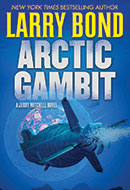 Jerry Mitchell, now the commodore of submarine Development Squadron Five, is dismayed when USS Toledo is reported missing in Arctic waters, close to Russian territory. The vessel is captained by his former shipmate and close friend, Lenny Berg. Eager to investigate, Jerry convinces the Navy to redirect one of his squadron’s boats to find out what happened.
Jerry Mitchell, now the commodore of submarine Development Squadron Five, is dismayed when USS Toledo is reported missing in Arctic waters, close to Russian territory. The vessel is captained by his former shipmate and close friend, Lenny Berg. Eager to investigate, Jerry convinces the Navy to redirect one of his squadron’s boats to find out what happened.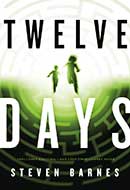 Around the world, leaders and notorious criminals alike are mysteriously dying. A terrorist group promises a series of deaths within two months. And against the backdrop of the apocalypse, the lives of a small shattered family and a broken soldier are transformed in the bustling city of Atlanta.
Around the world, leaders and notorious criminals alike are mysteriously dying. A terrorist group promises a series of deaths within two months. And against the backdrop of the apocalypse, the lives of a small shattered family and a broken soldier are transformed in the bustling city of Atlanta. Victor and Eli started out as college roommates—brilliant, arrogant, lonely boys who recognized the same sharpness and ambition in each other. In their senior year, a shared research interest in adrenaline, near-death experiences, and seemingly supernatural events reveals an intriguing possibility: that under the right conditions, someone could develop extraordinary abilities. But when their thesis moves from the academic to the experimental, things go horribly wrong.
Victor and Eli started out as college roommates—brilliant, arrogant, lonely boys who recognized the same sharpness and ambition in each other. In their senior year, a shared research interest in adrenaline, near-death experiences, and seemingly supernatural events reveals an intriguing possibility: that under the right conditions, someone could develop extraordinary abilities. But when their thesis moves from the academic to the experimental, things go horribly wrong.
